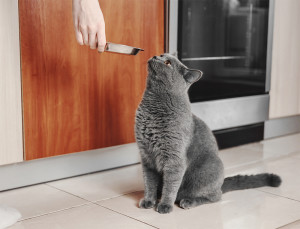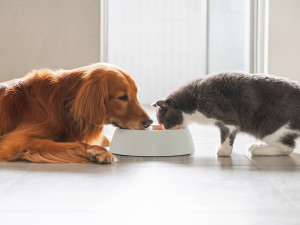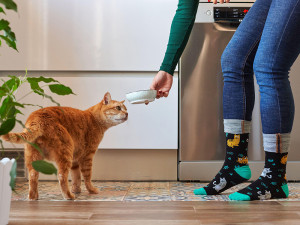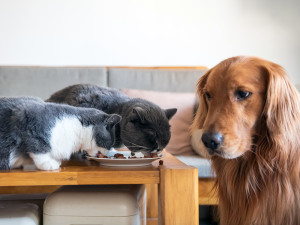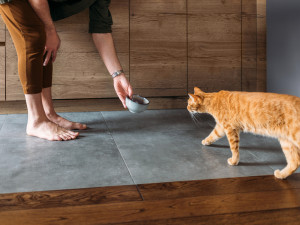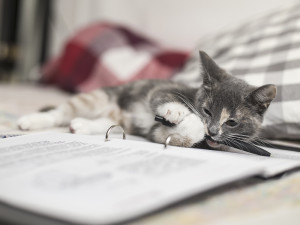Why Is Your Cat Always Hungry?
Even if you don’t think they should be.

Share Article
In This Article:
Why Is My Cat Eating More Than Usual? Understanding Cat Hunger: When It’s Normal vs. When It’s More Than Increased Appetite Reasons Other Reasons Your Cat Is Always Hungry Why Your Cat Is Always Hungry When to Consult a Vet for Your Cat’s Hunger Issue How to Prevent Your Cat from Overeating When to Seek Expert Help Frequently Asked Questions
Cats are notoriously good at telling time, especially when it gets close to meal times. And many cats err on the side of always running a few hours early, hoping that if they start pawing at your face and meowing in your ear before the sun comes up, they might get an early breakfast. This obsession with never wanting to miss a meal can lead cat parents to believe nearly all cats are hungry all the time.
When it comes to sorting out normal levels of cat hunger versus cats that are showing signs of more intense hunger, there are some important distinctions to note. Cats who are truly showing signs of an increased appetite accompanied by other signs like weight loss or weight gain, changes in their activity level, or other physical signs of illness are more likely to have a medical condition that is affecting their appetite.
Other times, cats may obsess about food for behavioral reasons. To get to the bottom of what’s going on with your cat, make sure to have your vet do a thorough exam and diagnostic tests to rule out the more serious medical conditions that could cause a ravenous appetite. Read on to learn more about the signs that your cat’s hunger is extreme and some of the most common explanations.

Why is my cat eating more than usual and hungry all the time?
Cats always seem to know when meal time is approaching and most cats rush to their bowl the instant it’s refilled, so how would you know if your cat is actually hungrier than usual? You may notice that your cat is sitting by their food bowl in between meal times, meowing or begging for food at unusual times even after they’ve been fed, stealing food from other pets or humans, or even trying to eat things that aren’t edible.
These can be signs that your cat is feeling more hungry than usual. If your cat is actually eating more, too, you’ll have a more objective way to measure their appetite and hunger. Changes in appetite can happen for many different reasons, so it is important to look for other clues in your cat’s physical health and behavior to pinpoint what’s going on.
If your cat’s increased appetite is accompanied by a dramatic shift in their weight or other physical changes like vomiting, increased thirst and urination, or diarrhea, these are more clues to an underlying medical problem. It is a good idea to see a vet anytime you notice a dramatic change in your cat’s appetite in order to rule out common medical causes first. If your cat has a clean bill of health, there may be behavioral explanations for their increased appetite that are worth exploring too.
Why is my cat constantly hungry? Medical reasons
There are many medical conditions that can cause your cat to have an increased appetite and act like they are hungrier than normal. This includes:
Hyperthyroidism in cats: Hyperthyroidism is a condition where cats develop an overgrowth of the thyroid gland that produces an excess of thyroid hormoneopens in new tab. These cats tend to be constantly hungry, experience dramatic weight loss, vomit frequently, and are more active and vocal, especially at night.
Parasites: Intestinal parasites absorb nutrients from cats’ digestive tracts, depriving cats of many essential elements of their diet. These cats may feel more hungry as their body tries to compensate for nutritional deficiencies by eating more.
Diabetes in cats: Diabetes mellitus is caused by a lack of insulin or resistance to insulin, preventing cells from taking up glucose, a sugar, to use for energy. As a result, cells can enter a starvation mode where they use alternative energy sources like protein or fat. This can result in cats feeling hungry all the time while losing weight, drinking more water, and urinating more than normal.
Pregnancy: This one may seem obvious but sometimes a change in appetite is an early sign of pregnancy in cats. If you have a female cat who is not spayed and she has been around male cats, keep this in mind. As a cat’s pregnancy progresses, her belly will start to grow bigger and rounder and her appetite will increase as she works to provide nutrients to her growing babies.
Pancreatic disease: The pancreas is responsible for making important enzymes that help in the breakdown and digestion of food. Cats with exocrine pancreatic insufficiency (EPI) do not make enough of these enzymes. As a result, much of their food is not properly digested and they are unable to absorb all the nutrients from a meal. This results in increased hunger, weight loss, and very large bowel movements containing undigested food.
Inflammatory bowel disease (IBD): Cats with inflammatory bowel disease have a lot of inflammation within their digestive tract which also prevents normal absorption of nutrients from their food. They may be more likely to vomit and/or have diarrhea as well. These cats often lose weight and may have an increased appetite if they are trying to replace nutrients that their body is not absorbing. Some cats also experience a decreased appetite as a result of nausea and/or pain related to inflammation and indigestion.
Cancer: Many forms of cancer can cause a syndrome in which cats lose weight despite eating. This may be due to changes in metabolism, decreased absorption of nutrients, or eating fewer calories per meal despite acting hungry.
Pica: Pica is a condition where cats try to eat non-food items. This can mean underlying medical causes such as nutritional deficiencies or anemia, or it can be a behavioral condition.
Why is my cat always hungry? Other reasons
If medical causes have been ruled out and your cat is physically healthy but just seems obsessed with food, there may be other explanations including:
Poor-quality food: If your cat’s diet is not providing enough protein, fat, or other vital nutrients, they may not feel satisfied even after eating a reasonable quantity of food. It is especially important to pay attention to the nutrient profile of cat food if you have a growing kitten, a pregnant or lactating cat, or a cat with specific nutritional needs. All cats need to eat a complete and balanced cat food diet to meet their unique needs as carnivores and to ensure they feel satisfied after eating.
Competition over food: If you have multiple cats, or even multiple pets of any kind, it is important to ensure everyone gets their own food and has a secure opportunity to eat their fill. Otherwise, some pets may bully others out of their food and prevent them from eating enough. If you notice competition or food stealing between your pets, be sure to separate them during meal times and keep a close watch to ensure everyone eats their own portion of food.
Infrequent meals: Cats usually do best when offered small, frequent meals throughout the day. If your cat is only fed once or twice a day, they may feel hungry in between the longer stretches. You can use puzzle feeders or timed feeders to offer your cat small meals throughout the day even if you are out of the house for many hours
Boredom or loneliness: Cats are fierce predators and if they didn’t live in your house, they’d spend most of their time hunting for prey. This is important to keep in mind as life indoors can get boring, especially if they spend a lot of their time being sedentary and/or alone. Cats need daily physical and mental enrichmentopens in new tab to fill their time, stay physically fit, and keep their minds sharp. When cats become bored or lonely, they may develop unhealthy behaviors, such as overgrooming, avoiding socialization, overeating, and/or becoming destructive.
Stress: Some cats also overeat due to stress. This can include stressful events like moving, construction in a home, or the introduction of new pets or people. It can also include competition between pets for food and may result in cats gorging themselves on food and/or vomiting if they eat too quickly.
Understanding cat hunger: when it’s normal vs. when it’s more than increased appetite
If your cat seems extra hungry, it could be for a simple and normal reason: they might just want attention or like the way their food tastes. However, there could be something more serious going on, like an illness or a change in their metabolism.
Reasons why your cat is always hungry
Here are some of the common reasons for cat hunger and when it could be more than just an increased appetite.
Boredom
Have you ever finished a sleeve of cookies in one sitting just because you had nothing better to do? Of course you have, and your cat is capable of the same behavior. Especially if you have an indoor cat, they might be asking for more food because they are bored and understimulated.
Garber says that especially when cats beg for food shortly after meals or when their pet parents are busy, “it's typically a sign of boredom rather than genuine hunger. They’ve learned that food-seeking behavior gets them the attention they’re craving.”
Try making eating more exciting and interesting for your cat by using food-puzzle toys to turn eating into a game and stop them from asking for more food.
Low-quality diet
Another reason your cat may seem hungry when they should be full is that they have a low-quality diet. Different foods have different caloric contents, and your cat might not be totally full from the food you’re giving them. If you think that your cat’s food isn’t properly satisfying them because of its quality, you can consult your vet or a nutritionist to get your cat a new diet that keeps them full and stops them from asking for more food.
Aging and changes in metabolism
Your cat may be extra hungry for biological reasons. As your cat ages, their metabolism changes, usually slowing down. However, for some cats, these metabolism changes can cause extra hunger and dissatisfaction with the amount of food they’re eating. Garber says that “a noticeable increase in appetite combined with weight loss, particularly in senior cats, often indicates metabolic changes that require veterinary attention.”
Additionally, as cats age, their bodies lose muscle mass, and this can cause them to feel hungrier.
Your vet is your first port of call to create a diet plan for your cat that takes into account their age, muscle mass, and other factors. They can recommend food with the right amount of fats, proteins, carbohydrates, and more that your cat needs every day.
Medication side effects
Is your cat on any medications? If they are, then their extra hunger might be one of the medication’s side effects. If this is the case, your vet can help you to come up with a new diet plan that takes into account their changing hunger. Unfortunately, you can’t just give them the amount of food they’re asking for, in case the extra food and weight causes extra issues like obesity and arthritis.
Intestinal parasites
One of the more serious reasons why a cat might be hungry and begging for extra food is that they have intestinal parasites. While many of us give our cats monthly medication to prevent intestinal parasites like worms, these medications aren’t faultless, and we might make a mistake and skip a dose. Parasites take the food that your cat ingests, which makes them hungry because they’re deprived of the nutrition that they need. You may see worms in their stools, but even if you don’t, they could have a parasite. You should take them to the vet if you suspect a parasite.
Hyperthyroidism
Your cat could seem hungrier than usual because of a medical issue like hyperthyroidism, when the thyroid is overactive, causing an excess of thyroid hormones. If they have hyperthyroidism, they may also show weight loss, vomiting, muscle wasting, behavioral changes, and increased thirst. There could also be behavioral signs like nervousness and hyperactivity. If in doubt, contact your veterinarian.
Diabetes
Diabetes isn’t only a human issue; all kinds of animals can get diabetes in their lifetime. If your cat seems endlessly hungry and is never satisfied by food, they could be diabetic. Other symptoms include weight loss, increased water consumption, and increased peeing. In severe cases, your cat might also be vomiting, listless, and have diarrhea.
Malabsorptive diseases
If your cat won’t stop eating or asking for food, they could also have a malabsorptive disease. These diseases could include Inflammatory Bowel Disease (IBD), which causes the small intestines to not properly absorb nutrients. This can lead to muscle wastage and weight loss, along with increased appetite. They might also be vomiting and have diarrhea. There are other malabsorptive diseases, too, so if you suspect your cat might have one, you should take them to the vet to have imaging and bloodwork done.
When to consult a vet for your cat’s hunger issue
Particularly if your cat has other symptoms such as weight loss, muscle wastage, or vomiting, you should contact your vet immediately to get on top of any potential diseases or health issues that they may have. Garber adds that “any significant change in appetite, especially when accompanied by weight loss, increased thirst, or behavioral changes, warrants a visit to the vet to rule out underlying medical conditions that might require treatment."
However, if your cat never seems satisfied with their meals and doesn’t have other symptoms, it’s still a good idea to contact your veterinarian to come up with a more appropriate, fulfilling diet that will keep them full.
How vets diagnose issues related to hunger
If your vet suspects that your cat has a medical issue relating to their hunger, they will offer you a number of tests to determine the cause. These tests might include bloodwork, urine testing, and abdominal imaging. Treatment will then depend on what these tests show or indicate.
How to prevent your cat from overeating
If your cat is asking for more food, it can be tempting to keep giving them what they want to keep them happy (and they can be very insistent). However, if they are overfed, they can develop further issues such as obesity and arthritis. You need to hold firm, and if the begging for food continues, you should contact your vet to find out if there are underlying medical issues.
When to seek expert help
If there is a sudden change in your cat’s appetite, whether that’s an increase or decrease, it is important to see a vet right away. There are many medical causes for changes in appetite and your vet will want to investigate the likely culprits right away to prevent more serious complications. Diseases like hyperthyroidism and diabetes often require medication to control them and routine monitoring. Even if you suspect a behavioral cause as the culprit, your vet can be a very helpful resource for addressing behavioral problems, recommending behaviorists and/or trainers in your area, and prescribing medication if needed.
Bottom line
An increased appetite can be the first sign of many health problems for cats, especially if it is accompanied by other physical changes.
It is important to see a vet whenever your cat has a sustained change in their appetite or other signs of physical illness.
There are also behavioral reasons for an increase in appetite and it is important to treat these properly to ensure your cat feels content and safe.
FAQs
Should you feed your cat every time they’re hungry?
No. While you might feel cruel denying your cat food, unfortunately, you could cause extra issues if you feed them beyond what they require for their nutritional needs. If you are worried that your cat is too hungry, you should consult a vet who can tell you exactly what they need.
Why is your cat constantly begging for food?
Your cat could be begging for extra food for any number of reasons: boredom, aging, a low-quality diet, malabsorptive diseases, diabetes, and more. You should consult your vet to find out exactly why they are so hungry and begging for food.
How do you stop your cat from being so hungry all the time?
Ultimately, the only way you can stop your cat from being so hungry is by getting to the bottom of the issue, whether it’s medical or behavioral. You can do this with the support of your vet. Garber adds that “the most effective approach combines strict meal scheduling, interactive feeding tools like food puzzles, and increased playtime. These all help regulate their food intake while addressing potential underlying boredom or attention-seeking behaviors.”
References
Delgado, M, et al. “Feeding Cats for Optimal Mental and Behavioral Well-beingopens in new tab.” Veterinary Clinics of North America Small Animal Practice, vol. 8, no. 50, 8 July 2020, pp. 939-953.
“How Often Should You Feed Your Cat?” Cornell University College of Veterinary Medicine, 16 Oct. 2017, www.vet.cornell.edu/departments/cornell-feline-health-center/health-information/feline-health-topics/how-often-should-you-feed-your-catopens in new tab.
Steiner, J. “Exocrine Pancreatic Insufficiency in Dogs and Catsopens in new tab." MSD Veterinary Manual, Modified September 2024.
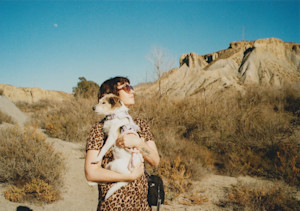
Marianne Eloise
Marianne Eloise’s work has appeared in The New York Times, The Guardian, The Cut, Vulture, and more. She is also the author of an essay collection Obsessive, Intrusive, Magical Thinkingopens in new tab. She has been going on adventures with her dog Bowie since she was 17.

Dr. Amy Fox, DVM
Amy Fox, DVM is a small animal veterinarian in New York City with over thirteen years of experience in a mixture of general practice, emergency medicine, and shelter medicine. A lifelong animal lover, Dr. Fox studied biology in college and then worked as a veterinary nurse before pursuing veterinary school at Cornell University. Her expertise includes surgery, dentistry, and management of chronic conditions, and she is interested in toxicology, pain management, nutrition, care of senior pets, and educational outreach. Dr. Fox also enjoys writing about veterinary medicine and teaching, and her work has previously appeared in Spruce Pets. In her free time, she loves to cook, garden, go for long runs, and hang out with her goofy mixed-breed dog May, who provides never ending comic relief!
Related articles
![orange cat being given a small cat food bowl]()
How Long Can Your Always-Hungry Cat Wait For Dinner?
Sometimes, they actually do need to eat.
![Two grey cats eating dog food from a plate while a brown dog looks on with jealousy]()
Can Cats Eat Dog Food?
It shouldn’t be their main course. Here’s why.
![Profile view of a man giving a cat food to eat]()
Why Is My Cat Not Eating? Causes, Symptoms, and Treatment
A veterinary nutritionist explains why your cat isn’t eating and how to increase their appetite.
![A cat laying on a binder chewing on a pen.]()
Why Does My Cat Eat Plastic?
If your cat nibbles on pen caps and power cords, they could be bored...
Why Does Your Cat Want You to Watch Them Eat
Do they really need an audience?
Why Does My Cat Eat Grass?
And should they?

